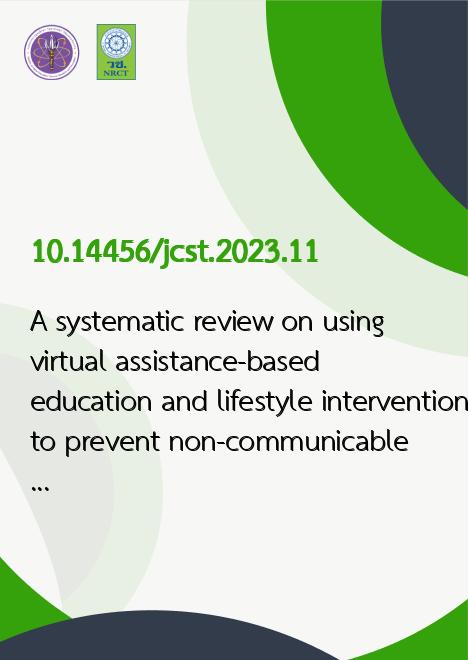
|
A systematic review on using virtual assistance‐based education and lifestyle interventions to prevent non-communicable diseases |
|---|---|
| รหัสดีโอไอ | |
| Creator | Soumi Ray |
| Title | A systematic review on using virtual assistance‐based education and lifestyle interventions to prevent non-communicable diseases |
| Contributor | Ankita Pareek |
| Publisher | Rangsit University |
| Publication Year | 2566 |
| Journal Title | ๋Journal of Current Science and Technology |
| Journal Vol. | 13 |
| Journal No. | 1 |
| Page no. | 118-135 |
| Keyword | a systematic review, digital therapeutics, information and communication technologies, health, non-communicable diseases, self-management, virtual health |
| URL Website | https://jcst.rsu.ac.th |
| ISSN | 2630-0656 |
| Abstract | Non-communicable diseases (NCDs) are chronic lifestyle disorders endangering a significant amount of the population and causing augmented morbidity and mortality. Virtual assistants (VA) empower these patients with the web, smart tracking equipment, and mobile-based interactivities. The availability of cheaper smartphones, internet, and fitness devices in the market of developed and developing nations is a boon. Technology aided in the effective utility of knowledge-sharing, awareness, and service proviso for NCD patients, thus optimizing the outcome. This manuscript reviewed published health intervention studies to prevent NCDs with VA‐based education and lifestyle modulation programs. It encompasses a systematic literature review, retrieving published VA articles from Pubmed, Embase, Google Scholar, Scopus databases, and government websites from January 2015 to January 2022. There were 21 articles meeting the inclusion criteria. Descriptive analysis was used. The international perception was provided in 62% of papers, while 38% provided the national review in India. Almost 38% of the studies found that VA using the various modes was highly effective for NCD patients. Another 38% implied that the method could be effective but with the refinement of tools, guidelines, and incorporation of suitable models. It was also highlighted (14%) the need for a pragmatic approach with in-depth studies to come to a definite conclusion. The findings accentuate that VA‐based education and lifestyle interventions to prevent NCDs in this healthcare turmoil; were cost-effective in the long run and held high promise in terms of efficacy, accessibility, and acceptability with the proper implementation and regulations. |